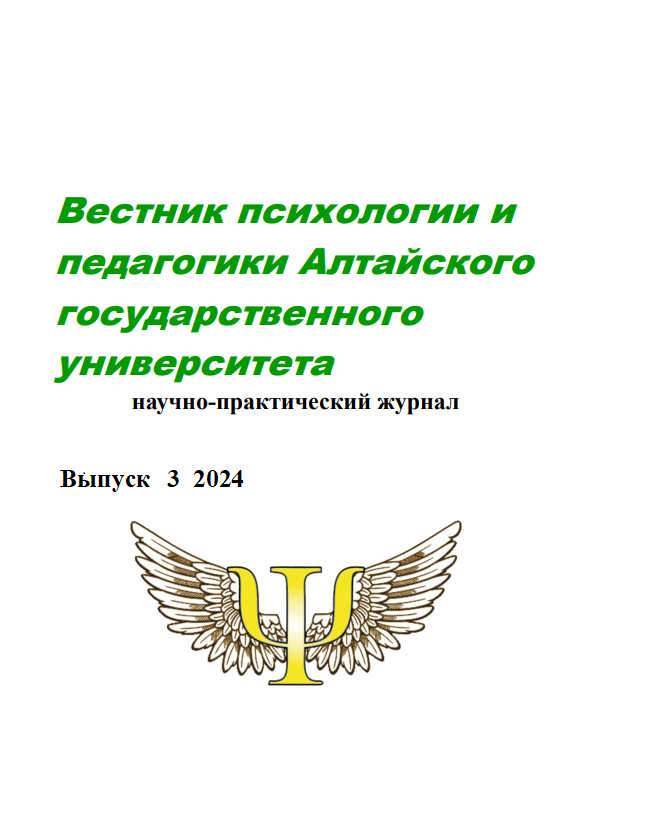GENDER CHARACTERISTICS OF SELF-MONITORING IN ADOLESCENCE: THE ROLE OF APPROVAL NEEDS
УДК 159.9
Abstract
Throughout our lives, we engage in interactions with others, and an essential aspect of this process is our ability to perceive ourselves and our actions from an external perspective. This involves evaluating how our behaviors are perceived by others and adjusting our actions accordingly—a skill known as self-monitoring. In adolescence, the development of this ability can significantly influence academic success, particularly at the onset of educational experiences.
The purpose of this study was to examine the self-monitoring behaviors of first-year students. Our findings reveal that boys exhibit a notably higher level of self-monitoring compared to girls. Furthermore, we discovered a substantial positive correlation between self-monitoring and the motivation for approval, which was consistently observed in both male and female participants.
Downloads
References
Даниленко Л.П. Особенности социально-психологической адаптации студентов при вхождении в вузовскую среду // Вестник Московского государственного университета. Серия: Психологические науки. 2020. № 1. С. 101–109.
Мамина В.П. Особенности социально-психологической адаптации студентов первого года обучения медицинского вуза // Общество: социология, психология, педагогика. 2021. №. 7. С. 67–70. URL: https://doi.org/10.24158/spp.2021.7.11.
Матьяш О.И., Погольша В.М., Казаринова Н. В., Биби С.А., Зарицкая Ж.В. Межличностная коммуникация: теория и жизнь. СПб. : Речь, 2011. 560 с.
Никитина А.В. Самомониторинг как одна из форм мониторинга общения // Известия ВГПУ. 2013. № 4(79). URL: https://cyberleninka.ru/article/n/samomonitoring-kak-odna-iz-form-monitoringa-obscheniya
Полежаева Е.А. Шкала самомониторинга и возможности её применения // Психологическая диагностика. 2006. № 1. С. 3–32.
Полежаева Е.А. Комплексность и негомогенность феномена самомониторинга. Часть 1. // Психологические исследования: электрон. науч. журн. 2009. № 3(5). URL: http://psystudy.ru
Полежаева Е.А. Комплексность и негомогенность феномена самомониторинга. Часть 2. // Психологические исследования: электрон. науч. журн. 2009. N 4(6). URL: https://www.researchgate.net/publication/359101598_Kompleksnost_i_negomogennost_fenomena_samomonitoringa_Cast_2
Разин В.В. Половые особенности эмоционального интеллекта личности студентов / Сборник научных трудов участников V межвузовской научно-практической конференции «Актуальные проблемы психологии и педагогики»; под общей редакцией Н.Б. Карабущенко, Н.Л. Сунгуровой.М. : Изд-во РУДН, 2020. С. 240–252.
Савин Е. Ю. Соотношение самомониторинга и коммуникативной рефлексии у студентов вуза // Мир науки. Педагогика и психология. 2022 № 1. URL: https://mir-nauki.com/PDF/23PSMN122.pdf
Шляпников В.Н. Половые различия в состоянии волевой регуляции у представителей маскулинных и фемининных национальных культур РФ и СНГ // Экспериментальная психология. 2020. Том. 13, № 2. С. 139–152. URL: https://doi:10.17759/exppsy.2020130210
Snyder M. Self-monitoring of expressive behavior // Journal of Personality and Social Psychology. 1974. Vol. 30. P. 526–537.
References:
Danilenko L.P. Osobennosti social'no-psihologicheskoj adapta-cii studentov pri vhozhdenii v vuzovskuju sredu. Vestnik Moskovskogo gosudarstvennogo universiteta. Serija: Psihologicheskie nauki. 2020. No 1. P. 101–109.
Mamina V.P. Osobennosti social'no-psihologicheskoj adaptacii studentov pervogo goda obuchenija medicinskogo vuza. Obshhestvo: sociolo-gija, psihologija, pedagogika. 2021. No 7. P. 67–70. URL: https://doi.org/10.24158/spp.2021.7.11.
Mat'jash O.I., Pogol'sha V.M., Kazarinova N. V., Bibi S.A., Zaric-kaja Zh.V. Mezhlichnostnaja kommunikacija: teorija i zhizn'. SPb. : Rech', 2011. 560 p.
Nikitina A.V. Samomonitoring kak odna iz form monitoringa obshhenija. Izvestija VGPU. 2013. No 4(79). URL: https://cyberleninka.ru/article/n/samomonitoring-kak-odna-iz-form-monitoringa-obscheniya
Polezhaeva E.A. Shkala samomonitoringa i vozmozhnosti ejo prime-nenija. Psihologicheskaja diagnostika. 2006. No 1. P. 3–32.
Polezhaeva E.A. Kompleksnost' i negomogennost' fenomena samo-monitoringa. Chast' 1. Psihologicheskie issledovanija: jelektron. nauch. zhurn. 2009. No 3(5). URL: http://psystudy.ru
Polezhaeva E.A. Kompleksnost' i negomogennost' fenomena samo-monitoringa. Chast' 2. Psihologicheskie issledovanija: jelektron. nauch. zhurn. 2009. No 4(6). URL: https://www.researchgate.net/publication/359101598_Kompleksnost_i_negomogennost_fenomena_samomonitoringa_Cast_2
Razin V.V. Polovye osobennosti jemocional'nogo intellekta lich-nosti studentov. Sbornik nauchnyh trudov uchastnikov V mezhvuzovskoj nauchno-prakticheskoj konferencii «Aktual'nye problemy psihologii i pe-dagogiki»; pod obshhej redakciej N.B. Karabushhenko, N.L. Sungurovoj. M. : Izd-vo RUDN, 2020. P. 240–252.
Savin E. Ju. Sootnoshenie samomonitoringa i kommunikativnoj refleksii u studentov vuza. Mir nauki. Pedagogika i psihologija. 2022. No 1. URL: https://mir-nauki.com/PDF/23PSMN122.pdf
Shljapnikov V.N. Polovye razlichija v sostojanii volevoj reguljacii u predstavitelej maskulinnyh i femininnyh nacional'nyh kul'tur RF i SNG. Jeksperimental'naja psihologija. 2020. Vol. 13, No 2. P. 139–152. URL: https://doi:10.17759/exppsy.2020130210
Snyder M. Self-monitoring of expressive behavior. Journal of Person-ality and Social Psychology. 1974. Vol. 30. P. 526–537.
Copyright (c) 2024 Надежда Захаровна Кайгородова, Татьяна Геннадьевна Волкова , Елена Николаевна Курсакова

This work is licensed under a Creative Commons Attribution 4.0 International License.
Bulletin of Psychology and Pedagogy of Altai State University is a golden publisher, as we allow self-archiving, but most importantly we are fully transparent about your rights.
Authors may present and discuss their findings ahead of publication: at scientific conferences, on preprint servers, in public databases, and in blogs, wikis, tweets, and other informal communication channels.
Bulletin of Psychology and Pedagogy of Altai State University allows authors to deposit manuscripts (currently under review or those for intended submission) in non-commercial, pre-print servers such as ArXiv.
Authors who publish with this journal agree to the following terms:
- Authors retain copyright and grant the journal right of first publication with the work simultaneously licensed under a Creative Commons Attribution License that allows others to share the work with an acknowledgement of the work's authorship and initial publication in this journal.
- Authors are able to enter into separate, additional contractual arrangements for the non-exclusive distribution of the journal's published version of the work (e.g., post it to an institutional repository or publish it in a book), with an acknowledgement of its initial publication in this journal.
- Authors are permitted and encouraged to post their work online (e.g., in institutional repositories or on their website) prior to and during the submission process, as it can lead to productive exchanges, as well as earlier and greater citation of published work (See The Effect of Open Access).







